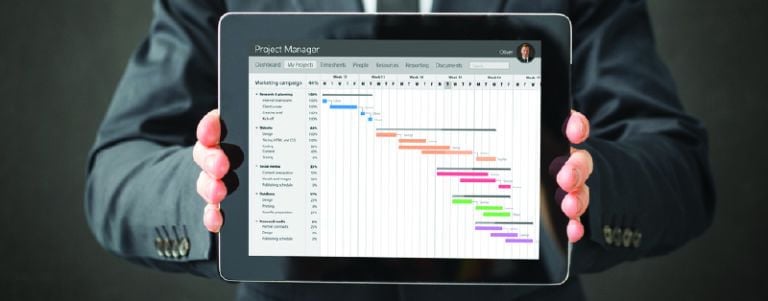How Lean Management Theory Helps Reduce Manufacturing Costs

You would have heard the term, but have you really understood what is Lean Management? Let’s explain this concept with an example. Say you are working on a customer project. The client has provided you with exhaustive details about their business, some of which may not be relevant to the project. To ensure the efficiency and quality of the project, you will focus on the pertinent details and ignore the rest. The extra information and layers can be considered waste, which would make the process unnecessarily complicated and inefficient.
That is the essence of Lean Management, when businesses remove waste from projects or tasks to deliver optimized outputs and increase efficiency. So the answer to the question ‘what is Lean Management’ is simply this: it is one of the best management approaches to help businesses configure relevant information. In this blog, we’ll dig deeper into what is Lean Management, its benefits, and key principles.
What is Lean Management?
Lean, in this context, means being efficient and causing no wastage in an industry or business setup. In the same vein, Lean Management refers to an organization’s methodology, technique, or approach to eliminate waste and make business processes more efficient. Since creating no wastage is unrealistic, Lean Management focuses on continuous improvement of management processes to eliminate as much waste as possible. Here, waste is referred to as any component that is redundant and adds no value to the business.
Simply put, Lean Management is a process, approach, or technology that helps enhance an organization’s overall efficiency through continuous improvement.
Importance of Lean Management
In order to understand what is Lean Management better, let’s analyze its importance:
Increases Operational Efficiency
Lean Management involves analyzing and streamlining management processes. It helps identify defects and eliminate errors, increasing efficiency and productivity.
Improved Quality
Lean Management focuses on constant analysis and optimization of processes. This is termed as continuous improvement. It ultimately helps reduce errors and improves the quality of products and services offered by a business.
Improved Safety
Lean Management is also important for organizations in the manufacturing and construction sectors. Since it involves analyzing business products, it enables businesses to identify and eliminate accident risks, thus leading to increased safety at the workplace.
Lean Management Principles
Identify Value
The Lean Management approach is based on a fundamental concept or assumption that the delivery of each product or service should be valuable to the customers. Therefore, one of the key principles of Lean Management is to examine or identify what value the business is providing to the customers. This helps determine what waste is being generated in the process so that it can be eliminated and the company can focus on value-adding elements.
Value Stream Mapping
The next principle is Value Stream Mapping (VMS). It involves creating a visual guide of all elements or processes involved from start to finish in an organization to analyze how the value is generated. Ultimately, it enables businesses to evaluate the process from a customer’s perspective and determine how the value is being offered to the customers. It involves analyzing every action in the process and eliminating redundant steps.
Create Continuous Workflow
Another essential principle of Lean Management involves creating a continuous workflow. It means providing single products constantly rather than sending items in batches. This principle ensures a continuous supply of products or services in the market to ensure customer satisfaction. It leads to the standardization of processes and reduces the risk of errors that might occur while delivering product or services in batches.
Create a Pull System
Creating a pull system in Lean Management refers to working on a process or initiating production only when the business receives the customer’s demand or signal. This ensures that optimum quantity is generated to meet customer demands, and no extra or waste products are generated.
Continuous Improvement
Lean Management, also known as Kaizen, focuses on continuous improvement or perfection. This principle focuses on constantly identifying errors in various business processes or overall management and consistently streamlining the processes to improve operational efficiency.
Benefits of Lean Management
Cost Savings
The ‘Pull’ principle in Lean Management allows businesses to streamline and control their production. It also ensures the quality of the products and services and reduces operational overheads. All these translate to improved cost savings.
Better Customer Satisfaction
Lean Management uses a customer-centric approach. Its goal is to ensure maximum customer satisfaction. This creates more revenue opportunities for businesses.
Increased Flexibility
Continuous improvement principle of Lean Management enables companies to be more responsive to change and quickly adapt to evolving market needs.
Increased Profitability
Lean Management focuses on improving overall efficiency, quality, and customer satisfaction. It results in increased profitability for businesses.
Lean Management Theory
Lean Management and lean production are often used interchangeably. Let’s understand what is Lean Management and how it is different from Lean production:
The Lean production philosophy was originally developed by Japanese auto giant Toyota to boost the efficiency of its manufacturing processes. This is why Lean production is referred to as the Toyota Production System (TPS).
The Lean Management theory stemmed from the Lean production ideology. While Lean production focuses on optimizing manufacturing processes by reducing waste, Lean Management enhances the overall efficiency of an organization through continuous improvement. It considers various departments and stakeholders of an organization and is, therefore, a more elaborate process.
Lean Management Tools
5S
This tool helps organize a workplace. It comprises the following:
- Sorting: Involves separating or removing the waste elements or resources that do not add any value to the process
- Straightening: Includes organizing the remaining elements
- Shining: Refers to inspecting and cleaning the workplace
- Standardization: Entails creating a defined process or standard for the above steps
- Sustaining: Focuses on being consistent or following the standards repeatedly
Kanban or the Pull System
It is a visual tool used for the graphical representation of receiving signals from the customer and managing the flow of work to ensure that production is done on the basis of demand.
Kaizen
This is a continuous improvement method that encourages all employees to identify and eliminate waste in their work.
Root Cause Analysis
This problem-solving tool helps identify the underlying causes of problems in a process that are producing waste or causing errors.
Lean Management Examples
Nike
Nike adopted Lean manufacturing to support its vision of sustainable manufacturing more than a decade ago. It uses the Lean methodology to increase the efficiency of its supply chain processes and reduce labor cost inflation.
Intel
Another company that significantly benefited from the implementation of Lean Management is Intel. In an interview, John Pemberton, General Manager of Global Construction at Intel, mentioned that adopting the Lean philosophy was the core strategy for Intel to increase efficiency. However, instead of Lean manufacturing, the company focused on Lean construction based on the same principles as the former.
Harley Davidson
Sean McCormack, Harley Davidson Motor Company’s Chief Technology Officer (CTO), in a podcast, explained how adopting Lean principles helped the company cater better to the demands of its customers. He mentioned that Harley Davidson implemented a continuous improvement process by creating dashboards that offer real-time updates on the performance of a manufacturing plant. He also mentioned that adopting a Lean manufacturing system helped reduce the security issues in their plants by 91%.
Rapid globalization and digitalization have led to the deployment of Lean Management by an increasing number of products and service businesses. In fact, traditional businesses and other service providers like healthcare and education are in dire need of Lean Management systems to simplify complex processes. Hence, the demand for skilled lean management professionals will likely increase in the future. You can learn more about what is lean management and other popular project management strategies by opting for Emeritus’ online courses on project management.
Write to us at content@emeritus.org






